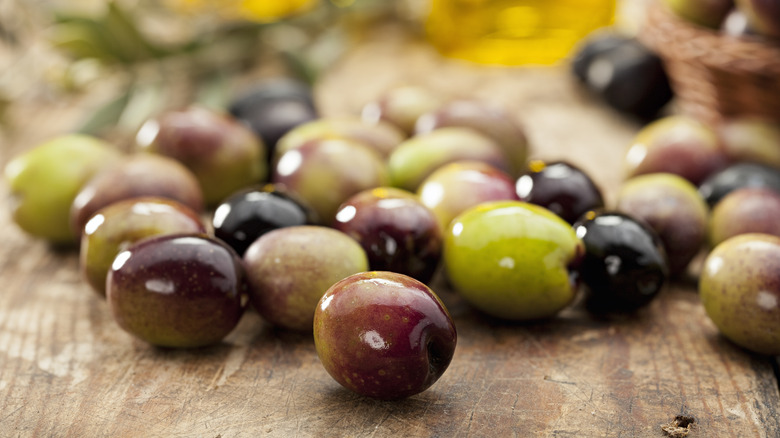Why It's Not Really Worth Trying To Make Olive Oil At Home
There are a lot of foods that are better when you make them from scratch — sauces and baked goods and pastas and so many others are just more delicious and more cost-effective when they're made fresh in your kitchen. It's often worth the extra hassle, additional time, and planning to whip up the homemade version. That isn't always the case, though. There are some foods for which (even though it may sound like sacrilege to the most dedicated of the home cooks) the local grocery store is just the superior option. Olive oil is one of them.
Although there are plenty of low-cost options, really good quality olive oil can be expensive, so the impulse to make your own isn't all that surprising. If you have dreams of yourself in bright linen clothes, peacefully pressing olives under the gentle glow of the Tuscan sun, though — you might want to banish that thought. Because without commercial-grade equipment, making olive oil from scratch is difficult, time-consuming, and often doesn't yield that much oil without a lot of olives. So invest in a top olive oil brand instead (and maybe just book yourself a stay at an Italian agriturismo).
The time and labor for homemade olive oil
Sure, homemade olive oil can be made without all the fancy equipment. All you really need is a press, a cotton cloth or strainer, and (of course) olives. Olives are technically the only ingredient, but you should add "time" and "patience" to your recipe, too. Canned olives will lead to oil that can go bad, so you have to start with fresh ones. If you don't have an olive press or a millstone, you can use a food processor or blender. You should probably start by pitting your olives. As the blender mashes the olives, it will also heat slightly, which extracts more liquid. Once you have a paste, strain the liquid from it through the cloth.
But wait — what you've got there isn't just olive oil, so you're not done yet. It's a mixture of olive oil and olive juice, the latter of which is quite bitter. Once you let the liquid sit for a while, the oil and juice will separate, with oil rising to the top. Often, you'll end up with a pretty small amount of oil, so you have to employ some tricks to extract more — like more blending, blending with hot water, and heating the paste on the stove. It's a lot of work for a small yield.
How it's done by the professionals
The life of an olive oil maker is a lot easier on a commercial level. Although olive oil has ancient origins, and the steps of the process have, in one sense or another, stayed the same for generations, the technique has been made a lot easier (and a lot more productive) by special equipment. Nowadays, there are still some traditional olive oil companies that use large millstones and pressing mats, but many use what's called the "continuous method." Olives are crushed by a mill, the paste is warmed by a kneading machine called a malaxer, then a centrifuge divides the olive juice and the olive oil. There's also the integral method, which removes the pits first and produces high-quality extra virgin olive oil.
Even the most traditional methods of making olive oil are easier than what can be done at home. The specialized pressing and extraction equipment ensures that the olives will produce a high yield and none of their oil will go to waste. If you're looking for a special project, have some fresh olives lying around unused, or want to especially impress guests at your dinner party, homemade olive oil might be the way to go. Otherwise, in the immortal words of Ina Garten, store bought is fine.


